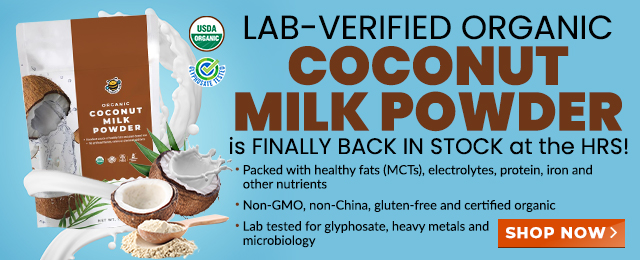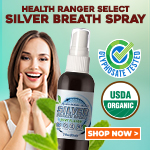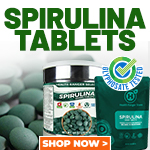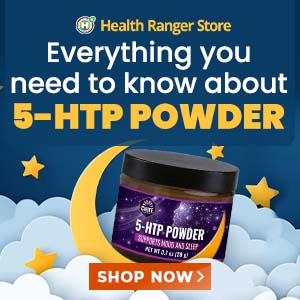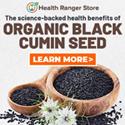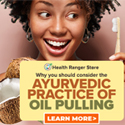
Anxious, depressed people over 65 turn more often to alternative therapies (press release)
Tuesday, September 05, 2006 by: NewsTarget
Tags: health news, Natural News, nutrition
- European Court of Justice: Healthcare professionals who promoted or administered COVID-19 vaccines are CRIMINALLY LIABLE for any harm caused
- Newly released JFK files reveal Pentagon's role in creating Lyme disease and covid in the same lab
- Oncologist warns of ‘terrifyingly aggressive’ cancers in children, linked to immune suppression from COVID vaccines
- Ancient kitchen secrets REVEALED: How garlic, ginger and green onions fight cancer and heart disease
- Britain’s descent into police state censorship: Parents raided for questioning their daughter’s school system online
- NIH study, buried for decades, reveals that Flu Shots INCREASE elderly deaths, not prevent them
- COVID-19 scandal linked to CANCER SURGE: Billionaire researcher sounds alarm
- DARPA: The shadowy innovator behind the world’s most advanced military technologies
- “Old Man in a Chair”: The COVID-19 pandemic was a carefully orchestrated scheme for global control
- Decentralize TV: Dr. Leonard Coldwell reveals shocking, heavily censored truths about CANCER, healing and the medical mafia complex
- Musk targets “strangely wealthy” lawmakers in DOGE probe, names Pelosi, McConnell, Schumer
- Cinnamon plays a critical role in diabetes management
- RFK Jr. is reforming Americans’ health: A shift in power and paradigm
- Utah governor allows ban on LGBT pride flags in public buildings and schools, will take effect without his signature
- FRAUD ALERT: Details DEMOCRATS do NOT want you to know about the $40 BILLION wasted on Fed-loaded credit cards cancelled by DOGE
- Scientists unveil breakthrough method to eliminate "Forever Chemicals" from water, transforming waste into graphene
- RFK Jr. is pushing Big Pharma ad ban - and corporate media is panicking
- Massive egg substitution recall: Bleach contamination sparks nationwide concern
- Newly released JFK files reveal Pentagon's role in creating Lyme disease and covid in the same lab
- CDC finally halts $11 billion COVID funding scam as health officials admit the ‘pandemic’ was a fraud
- Analysis: The coming economic collapse, a mass uprising and Trump's three secret weapons to halt the growing revolt
- Kiss Your Genetic Privacy Good-Bye! 23andMe Gets Green Light to Sell Your Intimate Genetic Details to Anyone They Want
- Dr. Suzanne Humphries makes bombshell appearance on Joe Rogan podcast, exposing vaccine industry deception back to POLIOMYELITIS
- DEADLY DECEPTION: How COVID vaccines increased mortality rates and why authorities hid the truth
- Woman contracts WORLD'S DEADLIEST VIRUS after unknowingly being given the WRONG VACCINE
- Oncologist warns of ‘terrifyingly aggressive’ cancers in children, linked to immune suppression from COVID vaccines
- Here are TEN all-natural ways to protect your garden without using harmful chemicals
- Black cumin seed oil emerges as a powerful ally against breast cancer and chronic inflammation
- The hidden dangers in your kitchen: How cooking methods impact diabetes, cancer and aging
- Trump's greatest betrayal so far: Accelerating Middle East wars, silencing dissent, and serving Zionist masters
- Senate Democrats deny censorship industrial complex existed, defend government's role in silencing dissent
- Sugar-free deception: Artificial sweeteners hijack hunger signals, fuel obesity epidemic, study warns
- “Independent” anti-Russia outlet MEDUZA faces COLLAPSE as US funding dries up
- NIH study, buried for decades, reveals that Flu Shots INCREASE elderly deaths, not prevent them
- The Health Ranger releases “Vaccine Zombie” song and music video, using AI-animated zombies for the music video
- Discovery of vast underground city beneath Giza pyramids challenges human history
- Newly released JFK files reveal Pentagon's role in creating Lyme disease and covid in the same lab
- California's social media censorship law struck down: A victory for free speech or a threat to online safety?
- EPA advisor admits the agency is funneling billions to climate groups ahead of Trump’s return to White House
- The Health Ranger releases “Vaccine Zombie” song and music video, using AI-animated zombies for the music video
- Dr. Mike Yeadon releases 15-minute testimony - WATCH - about genocidal intent of COVID “vaccines”
- Florida takes a stand: DeSantis proposes permanent ban on mRNA vaccine mandates
- Mike Adams releases country western hit single: Goin’ Back in Time is Comin’ Home
- “Why we influenced the 2020 elections”: Facebook files reveal the coordinated effort to bury the Hunter Biden laptop story
- Unpacking the Lies That We’ve Been Fed – new song and music video released by Mike Adams, the Health Ranger
- House Intelligence Committee calls for the ARREST and PROSECUTION of Dr. Anthony Fauci
- The pandemic as a tool for INDOCTRINATION: Understanding “The Indoctrinated Brain” by Dr. Michael Nehls
- Rep. Nancy Mace introduces bill to ban biological males from female facilities on federal property
- Mike Adams releases music poetry sensation: A Child of God
- Sugarcane extract superior to cholesterol-lowering drugs?
- Survival 101: Effective EMF blocking techniques
- Michigan sheriff announces criminal investigation into 2020 election crimes, Dominion Voting Systems
- Peter Rost exposes Big Pharma corruption in his book “The Whistleblower: Confessions of a Healthcare Hitman”
- Migrants are taking advantage of recent hurricanes to scam residents and loot their homes
- Red Cross issues warning to stop blood plasma donations from vaccinated people
- Scientists confirm: GENIUS brain function can be spontaneously unleashed in humans without any apparent cause
- EPA advisor admits the agency is funneling billions to climate groups ahead of Trump’s return to White House
- HYSSOP: What research reveals about the health benefits of this ancient holy herb
- Two containers with completed ballots fall out of truck in Florida
- Fully vaccinated about to see “tsunami” of illness and death, warns virologist
- Global leaders unite to clamp down on “misinformation” with UN-backed Cascais Declaration
- BREAKING: 2025 NDAA authorizes mandatory military draft of WOMEN across America… as Pentagon pursues global NUCLEAR war with both Russia and China at the same time
- Michael Yon warns of a ZIONIST TAKEOVER in Trump’s second administration
- BOMBSHELL: DNA testing kits are a SCAM to develop ethnic-specific bioweapons
- Ozempic and Wegovy weight loss drugs are injectable LIZARD VENOM PEPTIDES that may unleash a devastating wave of organ failure… side effects align with symptoms of SNAKE BITES
- Israeli soldiers accused of even more torture and abuse in the West Bank
- These 13 countries just signed an agreement to engineer a global FAMINE by destroying food supply
- NASA admits that climate change occurs because of changes in Earth’s solar orbit, and NOT because of SUVs and fossil fuels
- RFK Jr. clears key hurdle: Sen. Susan Collins backs controversial HHS nominee, signaling a new era for health policy
- Sermon 30: How Jesus reveals Caesar’s FAKE CURRENCY and FALSE AUTHORITY
- Coriander seeds: Ancient medicine backed by modern science
- Arizona officials claim Maricopa County needs 10-13 days to tabulate results of the election
Joseph. G. Grzywacz, Ph.D., and colleagues from Wake Forest University School of Medicine reported in the Journal of Alternative and Complementary Medicine that 34.9 percent of people over 65 who had symptoms of anxiety or depression used complementary or alternative medicine (CAM), compared to 26.5 percent of those without mental symptoms.
When praying for health is considered a form of CAM and added in, the percentage jumps to 81.7 percent of those with mental symptoms, compared to 64.6 percent of those without.
But the results showed that fewer than 20 percent of those with anxiety or depression used CAM to treat it. That was a surprise.
"Based on previous research and models of health self management, it was anticipated that CAM use would be greater among older adults with self-reported anxiety or depression than those without such conditions," said Grzywacz, associate professor of family and community medicine.
The results are based on the 2002 National Health Interview Survey (NHIS) Alternative Health Supplement, which Grzywacz said was "the largest and most representative study of CAM use in the U.S. population to date." The survey included 30,785 persons who participated in face-to-face interviews with U.S. Census Bureau personnel.
People who answered "yes" to the question "During the past 12 months have you been frequently depressed or anxious?" were defined as having anxiety or depression, he said.
"The findings demonstrate that a significantly greater proportion of older adults with anxiety or depression, in contrast to those without these conditions, use CAM," said Grzywacz. "These differences are driven by greater use of spiritual practices, relaxation techniques and non-vitamin, non-mineral natural products."
But he added, "Older adults with anxiety or depression generally do not use CAM to treat their mental conditions."
He said that the 2002 NHIS survey was the first with sufficient numbers of older adults to provide description of CAM use among those with anxiety and depression.
Grzywacz said that mental disorders among older adults are under-diagnosed and under-treated.
Partly, that's because people over 65 don't believe it is treatable. "Older adults frequently report that depressive feelings are a natural part of aging and may not view them as something requiring treatment," said Grzywacz.
Another surprise was that there was no difference among race or ethnic groups in the use of CAM for poor mental health. Last December, Grzywacz and his team reported that, among people over 65, blacks and Native Americans make much greater use of home remedies than whites. The differences seemed to be based on culture rather than access to health care.
In the current study, he said, "in the absence of conventional treatment, we expected that minority elders would seek other therapies to manage their mental health." But that didn't happen.
Other investigators in the study included Thomas A. Arcury, Ph.D., from Family and Community Medicine, and Sara A. Quandt, Ph.D., Ronny A. Bell, Ph.D., Wei Lang, Ph.D., and Cynthia K Suerken, M.S., all from the Division of Public Health Sciences. The research was supported by the National Center for Complementary and Alternative Medicine.
Media Contacts: Robert Conn, rconn@wfubmc.edu, Shannon Koontz, shkoontz@wfubmc.edu, or Karen Richardson, krchrdsn@wfubmc.edu, at (336) 716-4587.
Health news at FETCH.news
Get independent news alerts on natural cures, food lab tests, cannabis medicine, science, robotics, drones, privacy and more.
Take Action: Support Natural News by linking to this article from your website
Permalink to this article:
Embed article link: (copy HTML code below):
Reprinting this article:
Non-commercial use OK, cite NaturalNews.com with clickable link.
Follow Natural News on Facebook, Twitter, Google Plus, and Pinterest
Science News & Studies
Medicine News and Information
Food News & Studies
Health News & Studies
Herbs News & Information
Pollution News & Studies
Cancer News & Studies
Climate News & Studies
Survival News & Information
Gear News & Information
News covering technology, stocks, hackers, and more



"Big Tech and mainstream media are constantly trying to silence the independent voices that dare to bring you the truth about toxic food ingredients, dangerous medications and the failed, fraudulent science of the profit-driven medical establishment.
Email is one of the best ways to make sure you stay informed, without the censorship of the tech giants (Google, Apple, Facebook, Twitter, YouTube, etc.). Stay informed and you'll even likely learn information that may help save your own life."
–The Health Ranger, Mike Adams












